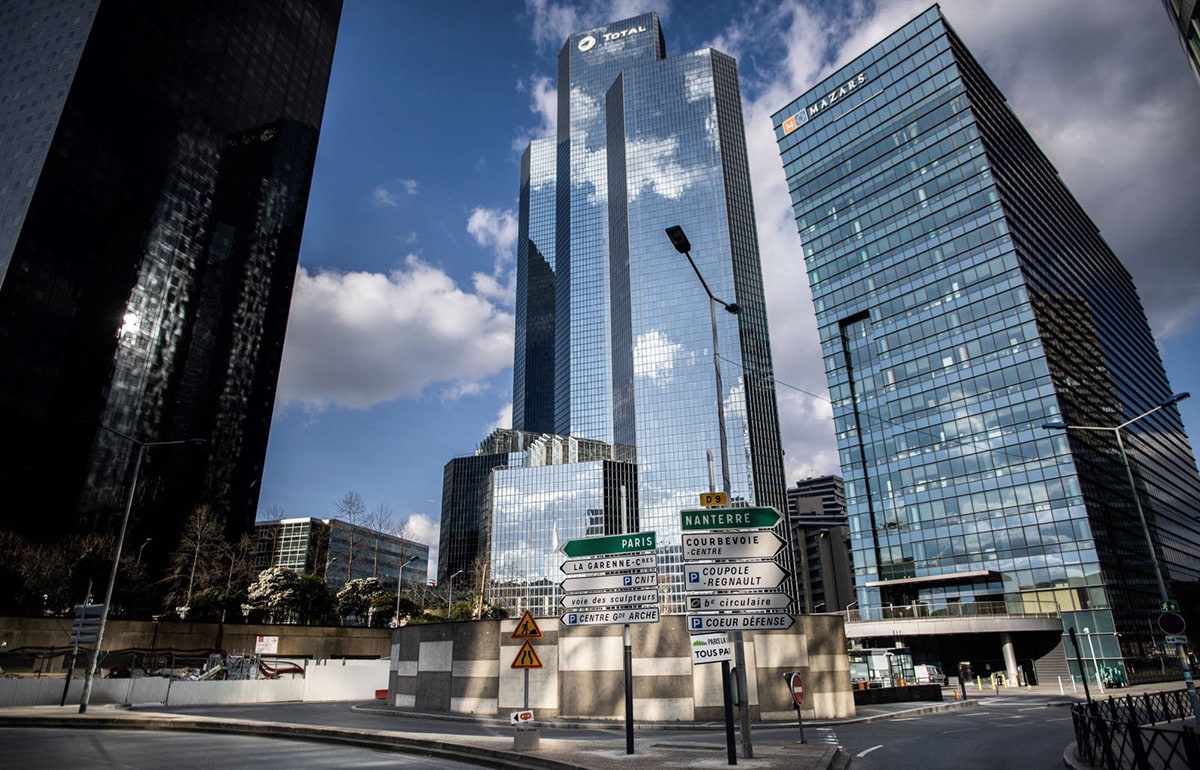Les grandes tours de bureaux ont-elles encore un avenir ? L’explosion du travail à distance avec la pandémie donne des idées aux entreprises qui y voient une source d’économies, quitte à changer le monde du travail en profondeur.
Depuis le début du confinement, les quartiers d’affaires se sont vidés, laissant une impression de fin du monde comme à Canary Wharf à l’est de Londres, ou à La Défense dans la banlieue ouest parisienne. Mais, même à l’heure de la reprise très progressive du travail qui tourne au casse-tête, c’est désormais leur avenir qui pourrait être en jeu, et ceux de leurs gratte-ciels et autres tours, symboles du capitalisme moderne et de la puissance des multinationales.
Des immeubles du passé
Jes Staley, le patron de la banque britannique Barclays, dont les imposants et luxueux locaux sont justement situés à Canary Wharf, estime ainsi que « mettre 7.000 personnes dans un immeuble pourrait être du passé. Nous trouverons des moyens pour opérer avec davantage de distances pendant longtemps« . Il résume l’état d’esprit de nombre de dirigeants de multinationales qui constatent le succès du travail à distance pendant la pandémie.
Le géant automobile français PSA réfléchit à en faire la « référence » pour ses activités hors production, qui concernent des dizaines de milliers de personnes, et le réseau social américain Twitter compte même autoriser certains salariés à travailler de chez eux de façon permanente.
« Cette pandémie a prouvé que la technologie permettait le travail à distance. Je pense que la vraie révolution viendra d’un changement d’état d’esprit des dirigeants sur la manière d’envisager la flexibilité« , explique à l’AFP Cydney Roach, une responsable du cabinet de conseil américain Edelman.
« Il est difficile de savoir ce sur quoi cela va déboucher, mais les salariés devront être impliqués dans la recherche de solutions« , estime-t-elle.
Le télétravail, une pratique qui s’est massivement imposée
Certes tous les secteurs ne peuvent pas appliquer le travail à distance, mais cette pratique s’est massivement imposée. Le géant britannique de la publicité WPP a placé ainsi près de 95% de ses 107.000 employés en télétravail, tout en continuant à maintenir les services à ses clients.
Le promoteur immobilier britannique Land Securities, très présents dans la City de Londres, a lui estimé récemment que seuls 10% de ses espaces de bureaux étaient utilisés.
« Il n’y aura jamais de retour à la normale« , pronostique Alex Ham, co-directeur général du courtier londonien Numis Securities. Le fait de se rendre au bureau du lundi au vendredi « ne reviendra tout simplement pas« , a-t-il pronostiqué au quotidien britannique The Telegraph.
Selon une enquête du géant du conseil immobilier Cushman & Wakefield, réalisée en avril auprès de 300 entreprises dans le monde, 89% d’entre elles estiment que le recours au travail à distance se poursuivra au-delà de la pandémie.
Avantages économiques
Clare Lyonette et Beate Baldauf, professeures à l’université de Warwick (centre de l’Angleterre), relèvent les avantages du télétravail pour les entreprises : économies – surtout compte tenu des loyers exorbitants de la City -, meilleure productivité ou encore diminution de l’absentéisme.
« L’immobilier est un des domaines qui coûtent le plus cher » aux entreprises mais les gratte-ciels « ne vont pas disparaître« , prévient Mme Roach, ne serait-ce que par la nécessité de conserver des bureaux dans « des lieux denses comme Manhattan« .
Les grands groupes pourraient être tentés toutefois de limiter leur patrimoine immobilier d’autant que réduire les coûts sera la priorité de nombre d’entre eux dans les prochaines années, pour absorber le choc économique de la pandémie.
Mais « les employeurs doivent être conscients des effets négatifs potentiels sur le long terme« , notamment l’impact négatif sur la cohésion des équipes, préviennent Clare Lyonette et Beate Baldauf. « Une diminution du bien-être et de la loyauté envers l’entreprise pourrait effacer en partie les économies réalisées« , ajoute-t-elles.
D’autant qu’il n’est même pas sûr que les salariés y soient vraiment gagnants. Selon le fournisseur de VPN, NordVPN, les salariés ont tendance pendant cette crise à travailler en moyenne de chez eux trois heures de plus par jour aux Etats-Unis et deux heures en France.
Source : AFP













Working from home will not lower the level of well being but clearly increase it for everyone, so yes the corporate world need to consider this alternative
Sera-ce la réalisation de l’histoire de Babel? Le divin confond les humains pour qu’ils sortent de la grande tour et se dispersent en petites communautés écologiques sur la terre. Comment alors repenser une modernité non concentrationnaire mais dispersée, réticulaire, horizontale? La ville jardin à hauteur d’homme?